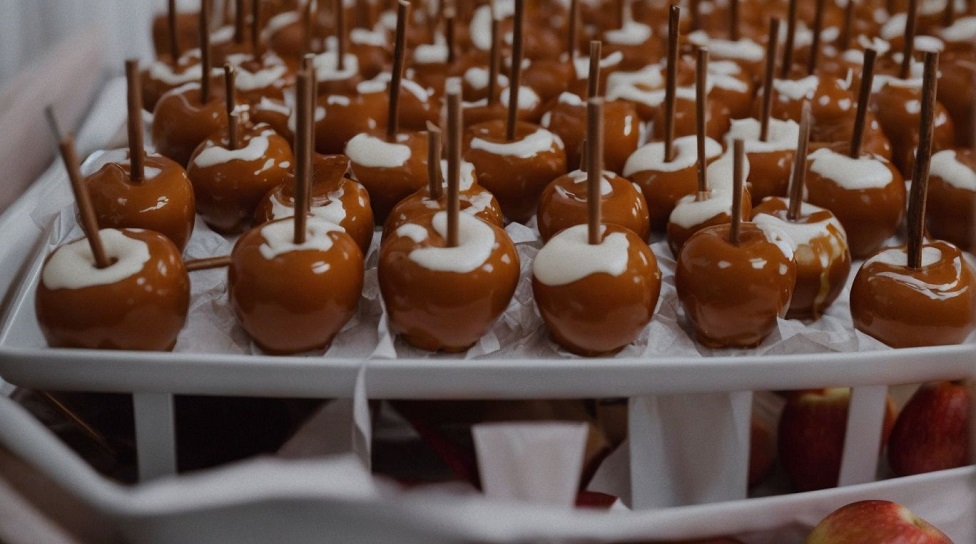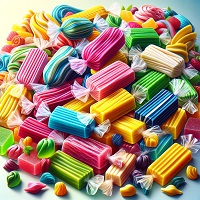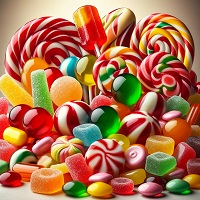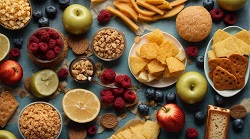According to the American Association of Orthodontists, it’s crucial to follow a proper diet while wearing braces to avoid any damage or delay in treatment. When in doubt ask your dental braces Port Credit what they recommend.
Key Points:
- To prevent damaging your braces, avoid sticky and chewy foods such as gum, caramel, and taffy.
- To avoid breaking brackets or wires, stay away from hard foods like nuts, hard candy, and ice.
- To reduce the risk of cavities and damage to teeth and braces, limit sugary and acidic foods and drinks.
What Foods Should You Avoid with Braces?
Taking care of your braces is crucial for a successful orthodontic treatment. One of the main aspects of maintaining your braces is being aware of the foods you consume. Some foods can harm or loosen your braces, which can result in setbacks in your treatment and can lead some to ask if braces are painful. In this article, we will talk about the types of foods that you should avoid while wearing braces and can be detrimental to your oral health.
1. Sticky and Chewy Foods
Sticky and chewy foods can be problematic for those wearing braces. Here are some steps to help navigate this issue:
- Avoid foods like caramel, taffy, and chewing gum, as they can get stuck and damage braces.
- Opt for softer alternatives like mashed potatoes, yogurt, or smoothies.
- Cut fruits and vegetables into smaller pieces to make them easier to chew.
- Steer clear of sticky candies, such as gummy bears or toffees.
- Choose foods that are less likely to get stuck, like lean meats or cooked pasta.
By following these steps, you can still enjoy a variety of foods while minimizing the risk of damaging your braces.
 2. Hard Foods
2. Hard Foods
When wearing braces, it is important to avoid hard foods to prevent damage to brackets and wires. Here are some steps to follow when dealing with hard foods:
- Cut hard foods into small, bite-sized pieces to make them easier to chew.
- Cook hard foods until they become soft and easier to eat.
- Choose alternative ingredients or substitutes for hard foods, like opting for mashed potatoes instead of raw carrots.
- Practice good oral hygiene, including brushing and flossing after meals, to prevent any food particles from getting stuck in your braces.
By being mindful of the hardness of foods and following these steps, you can still enjoy a variety of foods while wearing braces without risking damage to your orthodontic treatment.
3. Sugary Foods and Drinks
Consuming sugary foods and drinks can pose risks to braces and oral health. Protect your braces and maintain good oral hygiene with these steps:
- Limit sugary foods and drinks: Minimize consumption of candies, sodas, and sweet treats.
- Choose healthier alternatives: Opt for fruits, unsweetened beverages, and sugar-free snacks.
- Brush and floss regularly: Clean your teeth and braces after consuming sugary foods to prevent plaque buildup.
- Use mouthwash: Rinse your mouth with an alcohol-free mouthwash to further eliminate bacteria.
- Visit your orthodontist: Schedule regular check-ups to address any issues and ensure proper care.
By following these steps, you can enjoy a healthy diet while protecting your braces.
 4. Acidic Foods and Drinks
4. Acidic Foods and Drinks
Acidic foods and drinks should be avoided while wearing braces to prevent damage to the teeth and braces. These foods and drinks can erode the enamel, leading to tooth decay and staining. Examples of acidic foods and drinks include:
- citrus fruits
- tomatoes
- vinegar
- soft drinks
- fruit juices
Instead of consuming these items, opt for less acidic alternatives like:
- bananas
- potatoes
- milk
- water
It’s important to maintain a balanced diet and good oral hygiene while wearing braces to ensure the best possible treatment outcome.
5. Foods That Require Biting Into
When you have braces, it is important to avoid certain foods that require biting into. Here are some steps to help you enjoy your meals without damaging your braces:
- Cut foods into small pieces: Instead of biting into large fruits or vegetables, cut them into smaller, bite-sized pieces.
- Cook foods until soft: Opt for softer foods like steamed vegetables or tender meats that do not require excessive chewing.
- Use alternative ingredients: Find creative substitutes for crunchy foods, such as using lettuce wraps instead of bread for sandwiches.
- Practice good oral hygiene: After eating, make sure to brush and floss thoroughly to remove any food particles that may get stuck in your braces.
That leaves us asking the obvious question: what foods can we eat with braces?
What Are the Consequences of Eating the Wrong Foods with Braces?
When undergoing orthodontic treatment using braces, it is crucial to adhere to the instructions given by your orthodontist to achieve the optimal outcome. An important aspect of this is being aware of the types of food that should be avoided in order to prevent any harm to the braces. In this section, we will discuss the possible consequences of consuming inappropriate food with braces, such as the potential for brackets and wires to become damaged, an elevated risk of developing cavities, and the potential to extend the overall treatment duration.
 1. Damaged Brackets and Wires
1. Damaged Brackets and Wires
Damaged brackets and wires are common consequences of eating the wrong foods with braces. To prevent this, follow these steps:
- Avoid hard, crunchy foods like popcorn and nuts that can break brackets and wires.
- Steer clear of sticky foods like chewing gum and caramel that can pull on brackets and wires.
- Be cautious with tough meats and chewy breads that can damage braces when bitten into.
- Cut foods into small, manageable pieces to reduce the risk of damage while chewing.
- For added protection, use wax or silicone covers on brackets and wires.
True story: A friend of mine once had her braces damaged because she bit into a hard apple. It caused discomfort and required an emergency visit to the orthodontist for repairs. Remember to be mindful of the foods you eat to avoid such incidents.
2. Increased Risk of Cavities
Eating the wrong foods with braces can increase the risk of getting cavities. The brackets and wires in braces create more spaces for food particles and plaque to build up, making it more difficult to clean properly. This can lead to the development of cavities and tooth decay. It is advisable to avoid sugary and acidic foods as they can contribute to the growth of harmful bacteria. It is important to maintain good oral hygiene by brushing and flossing regularly to reduce the risk of cavities. Additionally, regular dental check-ups and cleanings are essential for maintaining oral health.
3. Prolonged Treatment Time
Prolonged treatment time is a concern for individuals wearing braces, as it delays the achievement of desired results. To minimize this risk, it is important to follow certain steps:
- Attend regular orthodontic appointments for adjustments and progress checks.
- Adhere to the orthodontist’s instructions regarding wear time and care of braces.
- Avoid consuming foods that can damage brackets and wires, leading to extra visits for repairs.
- Maintain good oral hygiene by brushing and flossing properly to prevent tooth decay and gum problems that can extend treatment time.
- Be patient and consistent with wearing elastics or other prescribed appliances, as neglecting them can prolong treatment.
How Can You Still Enjoy Your Favourite Foods While Wearing Braces?
Having braces can sometimes make it difficult to enjoy your favourite foods. However, with a few changes, you can still eat your beloved dishes without affecting your orthodontic treatment. In this section, we will provide some useful tips on how to continue enjoying your favourite foods while wearing braces. From cutting food into smaller pieces to maintaining good oral hygiene, there are several ways to satisfy your cravings without damaging your braces. Let’s delve into these helpful suggestions.
1. Cut Foods into Small Pieces
Cutting foods into small pieces is essential when you have braces to prevent damage and discomfort. Follow these steps to enjoy your favourite foods without risking your braces:
- Start by cutting larger foods, such as apples or carrots, into smaller bite-sized pieces.
- Use a sharp knife or kitchen scissors to make the cutting process easier and more precise.
- Avoid biting into hard or crunchy foods directly. Instead, cut them into smaller, more manageable portions.
- Take smaller bites and chew your food slowly and carefully to reduce the risk of damaging your braces.
Remember, by cutting your foods into smaller pieces, you can still enjoy a variety of foods while wearing braces. Just be mindful of how you eat and take the necessary precautions to protect your braces.
2. Cook Foods Until Soft
Cooking foods until soft is an effective way to make them more braces-friendly. Here are some steps to follow:
- Choose foods that are typically hard or crunchy, such as raw vegetables or tough meat.
- Cut the foods into smaller, bite-sized pieces to make them easier to cook.
- Use cooking methods like boiling, steaming, or stewing to soften the texture of the food.
- Cook the food until it reaches a tender consistency that is easy to chew and won’t put excessive pressure on your braces.
- Monitor the cooking time to avoid overcooking the food, which can make it mushy or lose its nutritional value.
- Enjoy your soft-cooked foods without worrying about damaging your braces or experiencing discomfort.
3. Use Alternative Ingredients
Using alternative ingredients can help you enjoy your favourite foods while wearing braces. Here are some steps to consider:
- Choose softer alternatives: Substitute harder ingredients like nuts with softer options such as mashed fruits or vegetables.
- Explore different textures: Experiment with purees, soups, or smoothies that provide a similar flavour profile to your desired dish.
- Consider protein alternatives: Replace tough meats with softer alternatives like fish or tofu.
- Opt for softer grains: Swap hard grains like popcorn or uncooked rice for softer options like couscous or quinoa.
Fun Fact: Did you know that incorporating alternative ingredients not only helps protect your braces but also promotes overall oral health?
4. Practice Good Oral Hygiene
To maintain good oral hygiene while wearing braces, it is essential to follow these steps:
- Brush your teeth thoroughly after every meal to remove any food particles that may be trapped in the braces.
- Use a soft-bristle toothbrush and fluoride toothpaste to clean both the braces and your teeth.
- Floss at least once a day using floss threaders or interdental brushes to reach between the braces and remove plaque.
- Rinse your mouth with an antimicrobial mouthwash to kill bacteria and freshen your breath.
- Visit your orthodontist regularly for check-ups and professional cleanings.
True story: Sarah diligently followed these oral hygiene practices while wearing braces and had a perfect smile at the end of her treatment. Her commitment to oral care paid off, and she maintained healthy teeth throughout the process.
Frequently Asked Questions
What are the general rules for eating with braces?
When it comes to eating with braces, there are some general rules to follow to prevent damage and discomfort. These include avoiding sticky and hard foods, cutting up crunchy fruits and vegetables, and limiting sugary foods and drinks. It is also important to practice good chewing technique and thoroughly rinse your mouth after eating. Don’t forget to see your braces dentist for your regular checkups.
What are the top ten foods to avoid with braces?
The top ten foods to avoid with braces include sticky sweets, hard candies, chewy candy, pizza crust, taco shells, hard rolls, hard crackers, pretzels, nuts, and ice. These foods can cause damage to braces or get stuck in them, leading to extra appointments and discomfort.
What are some other non-edible items to avoid with braces?
Besides food, it is important to also avoid chewing on non-edible items like pen caps, pencils, or fingernails as they can damage the braces. Chewing gum is also not recommended with braces.
What are some clear aligner options for those who want to avoid restrictions on food?
For those who want to avoid food restrictions with traditional metal or wire braces, there are options such as clear aligners such as Invisalign or lingual appliances. These can be removed for eating, allowing for a more typical diet. However, it is important to follow the orthodontist’s instructions for proper care and maintenance.
Are there any foods that can cause dental problems while wearing braces?
Yes, there are some foods that can contribute to dental problems while wearing braces. Sticky and sugary foods can lead to bacterial build up and tooth decay if not properly cleaned. Hard and crunchy foods can also cause damage to the braces, leading to extra appointments and discomfort.
How can I alleviate initial sensitivity when eating with braces?
It is common to experience some initial sensitivity when first getting braces or after adjustments. To alleviate this, it is recommended to stick to a soft food diet, such as soups, yogurt, and smoothies, for the first few days. Also, eating slowly and carefully and avoiding very hot or cold foods can help with sore teeth and gums.
For a Free Consultation For Braces in Port Credit
Call us at 289-805-6174 today at Lakeshore Dentistry in Port Credit for a free consultation. Our experienced dentists can help you find the solution for your crowded teeth.
Lakeshore Dentistry
125 Lakeshore Rd E Unit A-16
Mississauga, ON L5G 1E5



 2. Hard Foods
2. Hard Foods
 4. Acidic Foods and Drinks
4. Acidic Foods and Drinks
 1. Damaged Brackets and Wires
1. Damaged Brackets and Wires


